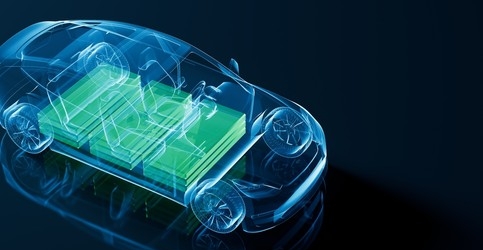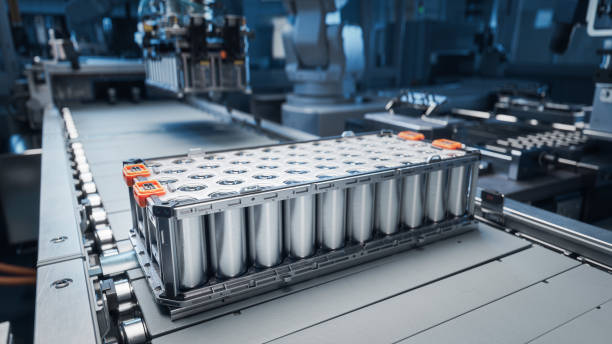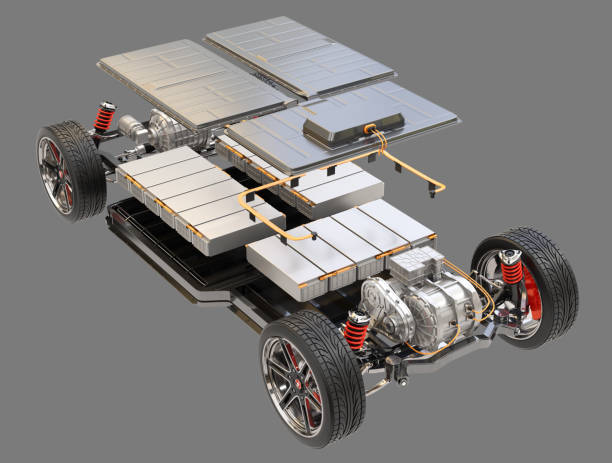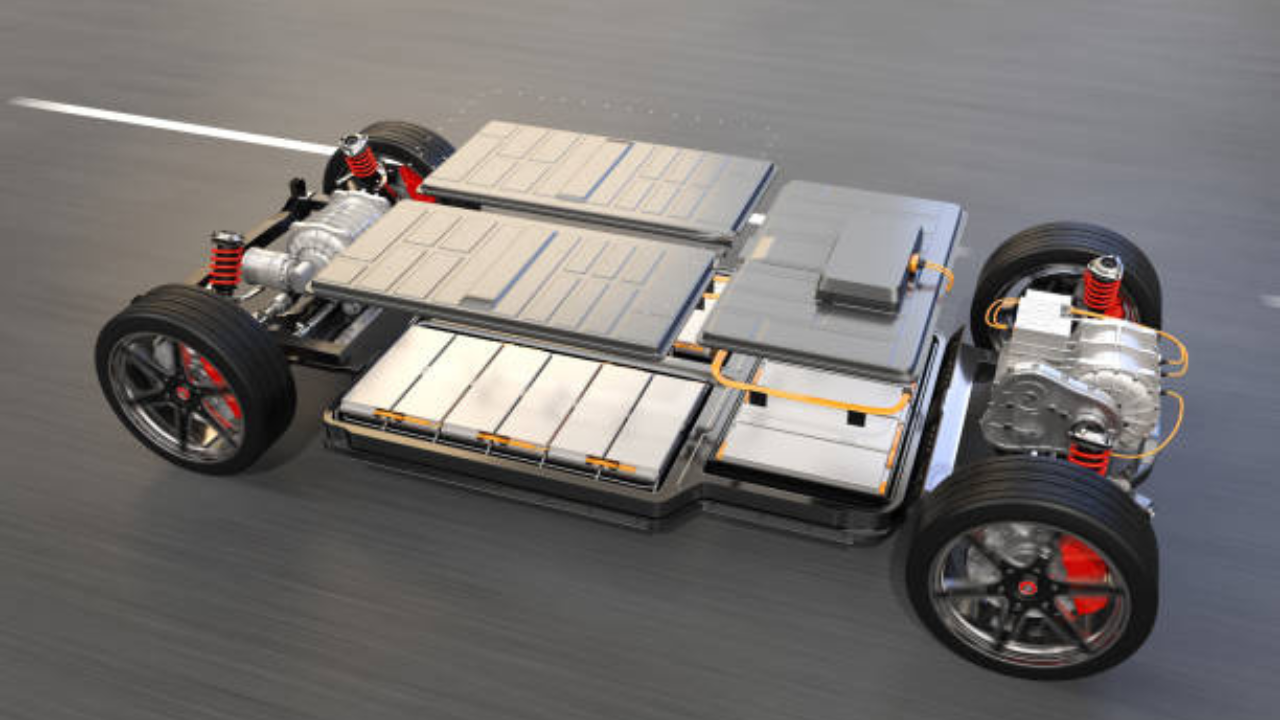Lithium ion batteries are commonly used in cars due to their high energy density and long-lasting performance. They provide reliable power for electric and hybrid vehicles, enabling longer driving ranges and efficient energy storage.
As a result, lithium-ion batteries have become the preferred choice for automotive applications, offering advantages such as faster charging times and lighter weight compared to traditional lead-acid batteries.
Lithium-ion batteries continue revolutionizing the automotive industry with technological advancements, contributing to the shift towards greener and more sustainable transportation solutions.
The Rise Of Lithium-ion Batteries
Discover the growing impact of lithium-ion batteries in powering electric cars. With their high energy density and long lifespan, lithium-ion batteries are revolutionizing the automotive industry by providing a sustainable and efficient energy source for electric vehicles.
Advancements In Battery Technology
Lithium-ion batteries have revolutionized the automotive industry with their numerous advantages. These batteries have come a long way in technological advancements, providing increased energy density, longer lifespan, and faster charging capabilities.
One of the significant advancements in lithium-ion battery technology is improving their energy density. This refers to the amount of energy that can be stored in a given volume or weight of the battery. Electric vehicles (EVs) can travel longer distances with higher energy density without frequent recharging.
This advancement has been a game-changer in adopting electric cars as a viable alternative to traditional combustion engine vehicles.
Another essential advancement in battery technology is the extended lifespan of lithium-ion batteries. In the past, battery degradation was a significant concern for EV owners.
However, lithium-ion batteries have a longer lifespan with more robust battery chemistries and improved manufacturing techniques. EV owners can now enjoy a reliable and long-lasting power source, reducing the need for frequent battery replacements.
Impact On Automotive Industry
The rise of lithium-ion batteries has profoundly impacted the automotive industry. It has sparked a shift towards electric vehicles, driving innovation and transforming the way we think about transportation.
One of the primary impacts is the reduced dependence on fossil fuels. Electric cars powered by lithium-ion batteries offer a greener alternative to traditional gasoline or diesel vehicles. They produce zero tailpipe emissions, significantly reducing greenhouse gas emissions and helping combat climate change. The automotive industry is taking a crucial step toward a more sustainable future by embracing battery technology.
Furthermore, adopting lithium-ion batteries has paved the way for increased research and development in EVs. As more automakers invest in electric vehicle technology, new and exciting advancements are being made.
This includes the development of advanced charging infrastructure, improved battery management systems, and breakthroughs in battery chemistry. The widespread adoption of lithium-ion batteries has opened up a world of possibilities for the automotive industry, driving innovation and pushing the boundaries of what is possible.
In conclusion, the rise of lithium-ion batteries has been a game-changer in the automotive industry. With advancements in battery technology and its impact on the industry, we can expect to see more electric vehicles on the road and a greener future.

Benefits Of Lithium-ion Batteries
Lithium-ion batteries are an excellent option for choosing the correct car battery. These advanced power sources offer numerous benefits, making them popular among car owners seeking reliability and efficiency.
This article will explore three critical advantages of car lithium-ion batteries: superior energy density, longer lifespan, and faster charging.
Superior Energy Density
Lithium-ion batteries boast superior energy density compared to conventional lead-acid batteries. This means they can store more energy in a smaller and lighter package, allowing for increased efficiency and power output. Lithium-ion batteries offer excellent range and performance with this improved energy density, making them ideal for electric and hybrid cars.
Longer Lifespan
One of the significant benefits of lithium-ion batteries is their longer lifespan, which can greatly outweigh that of traditional lead-acid batteries. Lithium-ion batteries have a significantly higher cycle life, allowing them to endure more charge and discharge cycles over their lifetime.
This means you can rely on your lithium-ion battery for extended periods without worrying about frequent replacements, saving you time and money in the long run.
Faster Charging
When charging your car battery, lithium-ion batteries have a distinct advantage over other battery types. With their advanced technology, these batteries can be charged much faster, significantly reducing the overall charging time.
This fast-charging capability ensures that you spend less time waiting for your car battery to be fully charged, enabling you to get back on the road quickly and conveniently.
Challenges And Limitations
Despite the numerous advantages of lithium-ion batteries, they have their fair share of challenges and limitations. Understanding these issues is crucial for the widespread adoption of electric vehicles and the sustainable development of the automotive industry.
Cost Considerations
Lithium-ion batteries are renowned for their high upfront costs, posing a significant barrier to the mass-market adoption of electric vehicles. The expense of raw materials, production processes, and research and development contribute to the elevated price tag of these batteries, making them a considerable investment for car manufacturers and consumers alike.
Battery Degradation
One of the critical challenges associated with lithium-ion batteries is their tendency to degrade over time. Factors such as temperature fluctuations, charging cycles, and usage patterns can lead to diminished performance and capacity, ultimately impacting the battery’s longevity. This degradation necessitates frequent replacements, adding to electric vehicles’ overall cost and environmental footprint.
Supply Chain Concerns
The supply chain for lithium-ion batteries is susceptible to disruptions and geopolitical uncertainties, directly impacting the availability and pricing of these essential components.
With a heavy reliance on mineral resources such as lithium, cobalt, and nickel, the industry faces concerns regarding sustainability, ethical sourcing, and geopolitical instability, amplifying the need for alternate battery technologies and diversified supply chains.

Environmental Impact
Lithium-ion car batteries have a significant environmental impact due to their production and disposal. These batteries contain toxic chemicals that can contaminate soil and water, contributing to pollution and harm to ecosystems. Additionally, the lithium mining for these batteries can result in habitat destruction and displacement of local communities.
Reduced Emissions
Lithium-ion batteries used in cars have significantly reduced emissions compared to traditional gasoline-powered vehicles. Unlike internal combustion engines, which emit carbon dioxide (CO2) and other harmful gases while burning fuel, electric cars powered by lithium-ion batteries produce zero tailpipe emissions, meaning they don’t release any pollutants directly into the atmosphere.
We can reduce air pollution and combat climate change by transitioning to electric vehicles with lithium-ion batteries. The reduction in emissions is especially crucial in urban areas, where air quality often suffers due to heavy traffic and high concentrations of vehicles.
Furthermore, using lithium-ion batteries also contributes to a decrease in noise pollution. Unlike combustion engines, electric cars are much quieter, resulting in quieter streets and neighborhoods.
End-of-life Battery Disposal
As with any technology, the disposal of lithium-ion batteries at the end of their life cycle requires careful consideration to minimize environmental impact. It is essential to handle the disposal of these batteries properly to prevent potential pollution and promote responsible waste management.
Recycling lithium-ion batteries is a crucial step in mitigating the environmental impact. These batteries contain valuable materials like lithium, cobalt, nickel, and copper that can be extracted and reused to produce new batteries. Recycling conserves resources and prevents potentially hazardous substances from entering landfills and polluting soil and water sources.
Proper recycling facilities have stringent processes to ensure the safe extraction of valuable materials and the responsible disposal of harmful byproducts. Governments and regulatory bodies play a vital role in enforcing regulations and encouraging the establishment and adherence to sustainable recycling practices.
In addition to recycling, research and development efforts are underway to improve the longevity and sustainability of lithium-ion batteries. This includes exploring ways to enhance their energy storage capabilities, extend their lifespan, and reduce the need for frequent replacements.
Future Scenarios
Lithium-ion batteries hold promising potential for the future of electric cars, offering long-lasting power and efficient energy storage. With their lightweight design and impressive performance, these batteries pave the way towards a greener and more sustainable automotive industry.
Integration With Renewable Energy
The future of lithium-ion batteries for cars holds immense potential when integrating renewable energy sources. As society moves towards a greener and more sustainable future, the need for clean energy solutions becomes increasingly apparent.
With the widespread adoption of electric vehicles, combining lithium-ion batteries with renewable energy can pave the way for a genuinely eco-friendly transportation system.
One of the most exciting possibilities is the use of electric vehicles as a means to store excess electricity generated from renewable sources such as solar and wind. Connecting these vehicles to the power grid can act as mobile energy storage units, helping stabilize energy supply and demand. This integration allows for a more efficient utilization of renewable energy, reducing reliance on traditional fossil fuel-based power plants.
In addition, intelligent charging systems can be developed to optimize the charging process based on the availability of renewable energy. This means electric vehicles can be charged during high renewable energy generation periods, maximizing the utilization of green power and minimizing dependence on fossil fuels.
Moreover, the integration of lithium-ion batteries with renewable energy has the potential to create a decentralized energy system. With electric vehicles acting as energy storage units, communities can become more self-sufficient regarding their energy needs. This localized approach reduces transmission losses and enhances grid resilience, allowing for a more efficient and robust energy infrastructure.
Innovations In Battery Technology
As the demand for electric vehicles continues to rise, significant advancements in battery technology are crucial to drive their widespread adoption. Fortunately, researchers and innovators worldwide are actively working on improving lithium-ion batteries’ capacity and performance.
Numerous breakthroughs have occurred in recent years, paving the way for enhanced battery performance. These innovations include the development of solid-state lithium-ion batteries, which offer higher energy densities, improved safety, and longer lifespans. Additionally, advancements in electrode materials, such as silicon-based anodes, allow for more excellent energy storage capabilities and faster charging times.
Furthermore, ongoing research focuses on increasing the longevity of lithium-ion batteries. By optimizing the battery’s chemistry and structure, scientists aim to enhance its durability and decrease degradation over time.
This means that future electric vehicle owners can enjoy the benefits of longer-lasting batteries, reducing the need for frequent replacements and resulting in a more sustainable and cost-effective transportation solution.
Wireless charging technologies are being developed to make electric vehicles more practical and convenient. This wireless charging eliminates the need for physical connections and streamlines the charging process, making it more seamless and user-friendly.
In conclusion, the future scenarios for lithium-ion batteries in cars are promising. Integrating these batteries with renewable energy sources holds the potential to revolutionize the energy landscape and create a more sustainable transportation system.
Additionally, ongoing innovations in battery technology ensure that electric vehicles become more efficient, practical, and accessible to a broader audience. With continued advancements and investments in this field, a greener future powered by lithium-ion batteries is well within reach.

Lithium-ion batteries for cars tesla
Lithium-ion batteries are a crucial component in Tesla electric cars. These batteries utilize lithium ions to generate electrical energy, providing power for the vehicle’s electric motor. Tesla’s choice of lithium-ion technology is primarily due to its high energy density, which allows for longer driving ranges on a single charge.
Tesla’s electric vehicles (EVs) use cylindrical lithium-ion battery cells. The specific chemistry and design of these cells contribute to the overall performance and efficiency of the battery pack. The batteries are typically arranged in modules, which are combined to form a pack integrated into the vehicle.
One of the advantages of lithium-ion batteries is their ability to store a significant amount of energy relative to their size and weight. This is essential for electric vehicles, allowing for a more extended driving range and better overall performance.
Additionally, Tesla has invested in research and development to improve battery technology, aiming to enhance energy density, reduce costs, and increase the lifespan of the batteries.
The advancements in Tesla’s battery technology, such as nickel-cobalt-aluminum (NCA) or nickel-manganese-cobalt (NMC) chemistries, have improved energy density and overall performance. The company has also been developing its battery cells, as seen in initiatives like the “4680” battery cell, which is larger and aims to offer higher energy density and improved manufacturing efficiency.
In summary, Tesla’s use of lithium-ion batteries underscores its commitment to advancing electric vehicle technology, providing longer ranges, faster charging times, and improved overall car performance.
Best lithium-ion batteries for cars
Determining the “best” lithium-ion car batteries involves considering various factors, including energy density, lifespan, safety, and cost. Several manufacturers are recognized for producing high-quality lithium-ion batteries for electric vehicles.
Please note that developments may have occurred since then, and checking for the latest information is advisable. As of my last update, some notable lithium-ion battery manufacturers include:
- Tesla/Panasonic: Tesla has been a pioneer in electric vehicles and collaborated with Panasonic to produce high energy density and performance batteries. Tesla’s advancements in battery technology, such as the 4680 cell, showcase its commitment to pushing the boundaries.
- LG Chem: LG Chem is a South Korean company that supplies batteries to various automakers, including General Motors. Their batteries are known for their high energy density and durability.
- Samsung SDI: Another major player from South Korea, Samsung SDI, is a key supplier to electric vehicle manufacturers. They focus on developing batteries with improved energy density and safety features.
- CATL (Contemporary Amperex Technology Co. Limited): CATL, a Chinese company, has become a leading lithium-ion battery manufacturer. They supply batteries to various automakers globally and are known for their diverse product offerings.
- SK Innovation: Another South Korean company, SK Innovation, is making strides in the electric vehicle battery market. They supply batteries to several automakers and invest in research and development to enhance their battery technology.
- Panasonic: Besides collaborating with Tesla, Panasonic supplies batteries to other automakers. They are known for their experience in battery manufacturing and have a strong presence in the electric vehicle market.
It’s essential to consider the specific requirements and priorities of the automaker and the vehicle application when determining the “best” lithium-ion batteries.
Factors such as energy density, charging speed, lifespan, and safety features can vary based on the manufacturer and the specific chemistry of the battery cells. Additionally, advancements in battery technology may have occurred since my last update.
Frequently Asked Questions Of Lithium Ion Batteries For Cars
How Long Do Lithium Ion Batteries Last In Cars?
Lithium-ion batteries in cars typically last between 8 to 10 years. However, usage patterns, climate conditions, and maintenance can affect their lifespan. Following manufacturer guidelines for optimal performance and considering replacement after this timeframe is essential.
Are Lithium Ion Batteries Safe For Car Use?
Yes, lithium-ion batteries are safe for car use. They have built-in safety features, such as a battery management system that prevents overcharging and overheating. However, like any battery, proper handling, storage, and maintenance is crucial to ensure safety and avoid potential risks.
Can Lithium Ion Batteries Be Charged While Driving?
Yes, lithium-ion batteries can be charged while driving. Electric vehicles and hybrid cars use regenerative braking technology, which converts kinetic energy into electrical energy to charge the battery while the vehicle is in motion. This helps maximize battery efficiency and range.
Can lithium-ion batteries be used in cars?
Yes, lithium-ion batteries can be and are commonly used in cars for electric and hybrid vehicles.
How Do lithium-ion batteries Benefit Cars?
Lithium-ion batteries offer several benefits for cars. They are lightweight, have a high energy density, and provide longer driving ranges than traditional lead-acid batteries. Additionally, they can be charged faster, have a longer lifespan, and contribute to reducing greenhouse gas emissions, making them an ideal choice for electric and hybrid vehicles.
Are lithium-ion car batteries better?
Lithium-ion car batteries are generally better than lead-acid batteries due to their higher energy density, lighter weight, and longer lifespan.
Which lithium-ion battery is best for electric vehicles?
There isn’t a single “best” lithium-ion battery for electric vehicles, as manufacturers use various battery chemistries and designs. Common choices include NCA (Nickel Cobalt Aluminum), NCM (Nickel Cobalt Manganese), and LFP (Lithium Iron Phosphate). The selection depends on energy density, cost, safety, and specific vehicle requirements.
How long do lithium car batteries last?
The lifespan of lithium car batteries varies, but they typically last around 8 to 15 years, depending on factors like usage, temperature conditions, and charging practices. Advances in battery technology may influence future longevity.
What are the disadvantages of lithium-ion batteries in cars?
Disadvantages of lithium-ion car batteries include cost, limited lifespan, sensitivity to temperature extremes, safety concerns, resource dependency, battery weight, and complex recycling.
Conclusion
In sum, lithium-ion batteries offer a promising solution for the future of car technology. They are well-suited for electric and hybrid vehicles with their high energy density and long lifespan. As the automotive industry continues to evolve, the widespread adoption of lithium-ion batteries will play a crucial role in reducing emissions and promoting sustainable transportation.

I am a technology Specialized . I have experience in Technology, and all types of electronic devices like Battery . So I work on solving these issues and give various tips on these issues
